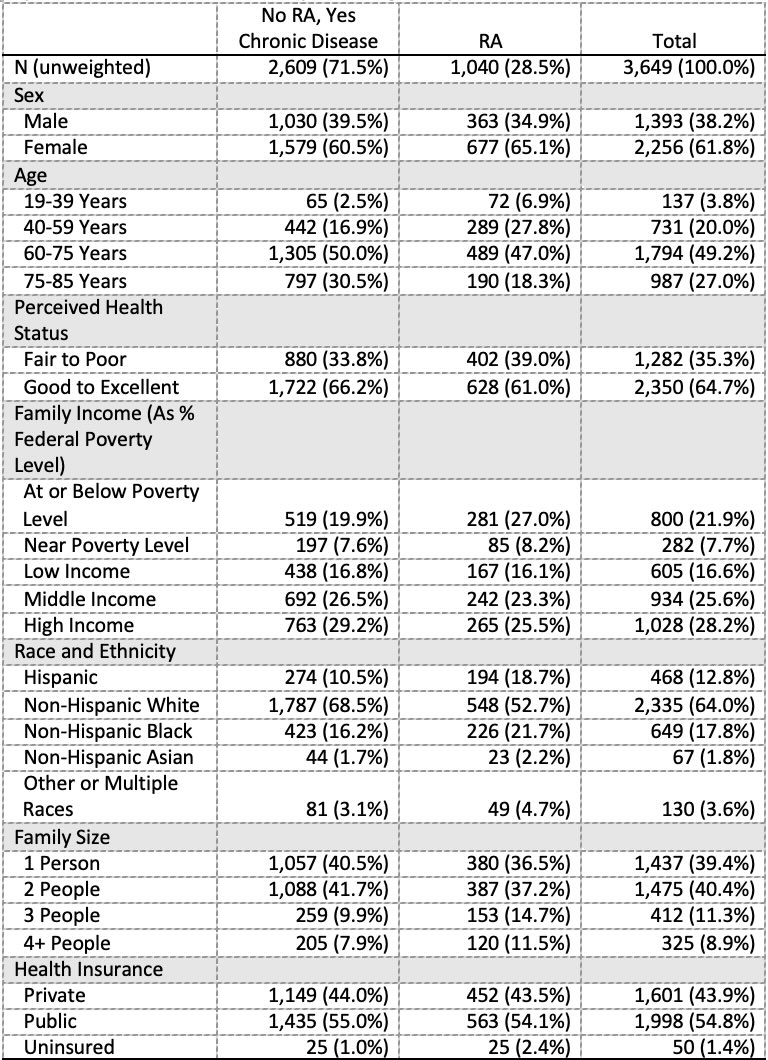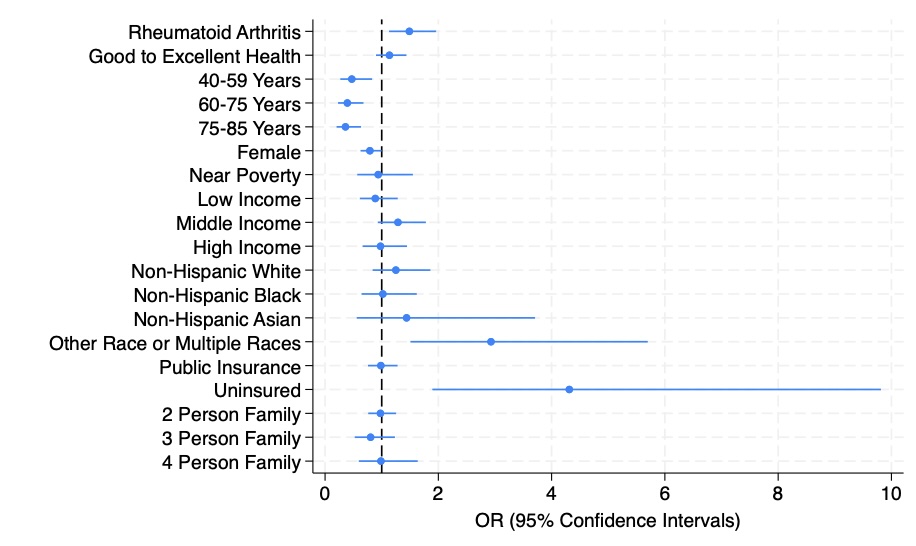Session Information
Session Type: Poster Session A
Session Time: 10:30AM-12:30PM
Background/Purpose: Studies that evaluate experiences of living with rheumatoid arthritis (RA) have found that patients identify self-empowerment and a sense of control as important factors in disease management. Whether RA patients’ beliefs about self-management differ from individuals with other chronic diseases is incompletely understood. The purpose of this study is to evaluate how patients with RA differ from patients with other chronic diseases in their beliefs about self-management using a large, nationally representative survey.
Methods: This cross-sectional study used data from the 2021 Medical Expenditure Panel Survey (MEPS), a national survey of patients, families and providers on health care use, cost, coverage and satisfaction in the United States, conducted by the Agency for Healthcare Research and Quality. We selected survey respondents who reported having RA or other chronic diseases. The primary outcome of interest was whether patients reported being able to “overcome ills without medical help,” a proxy measure for self-management. Survey responses were recorded on a simplified Likert scale as either disagreeing, being uncertain or agreeing. Ordinal logistic regression was used to assess the association of RA status with self-management beliefs, adjusting for age, sex, race, insurance status, health status, family income and family size. We tested for interactions between insurance status and family size with RA status on self-management.
Results: In our unweighted sample of 3,649 adults, 61.8% were female, 12.8% self-identified as Hispanic, 54.8% were publicly insured and 21.9% were below the federal poverty level (Table 1). Among the weighted sample (n= 24,770,323), 14.3% of RA patients reported efficacy in self-management compared to 10.3% of patients with other chronic diseases. In the weighted model (Figure 1) the odds of having a higher level of agreement to being able to self-manage disease was 1.49 times greater in RA compared to respondents with other chronic diseases (aOR 1.49, 95% CI [1.13, 1.96], p=0.005). As age increased, respondents had lower odds of agreeing that they were able to self-manage disease (aOR 0.36, 95% CI [0.20, 0.64], p < 0.001 for 75-85 year-olds compared to 19-39 year-olds). Uninsured respondents also reported higher odds of disease self-management (aOR 4.31, 95% CI [1.90, 9.81], p=0.001). Only age was identified as a significant cofounder in our model. Insurance status and family size did not interact with RA status on self-management (p > 0.55).
Conclusion: In this nationally representative survey, RA patients reported greater efficacy in self-management than patients with other chronic diseases, even after adjusting for several potential confounders. These findings suggest that patient beliefs and abilities to perform self-management may vary across different chronic diseases. Further research is needed to explore whether, and how, strategies to improve self-management should be tailored to different chronic diseases.
To cite this abstract in AMA style:
Good S, England B, Volkmann E. Beliefs on Self-Management in Rheumatoid Arthritis Compared to Other Chronic Diseases Using the Nationally Representative Medical Expenditure Panel Survey [abstract]. Arthritis Rheumatol. 2024; 76 (suppl 9). https://acrabstracts.org/abstract/beliefs-on-self-management-in-rheumatoid-arthritis-compared-to-other-chronic-diseases-using-the-nationally-representative-medical-expenditure-panel-survey/. Accessed .« Back to ACR Convergence 2024
ACR Meeting Abstracts - https://acrabstracts.org/abstract/beliefs-on-self-management-in-rheumatoid-arthritis-compared-to-other-chronic-diseases-using-the-nationally-representative-medical-expenditure-panel-survey/


